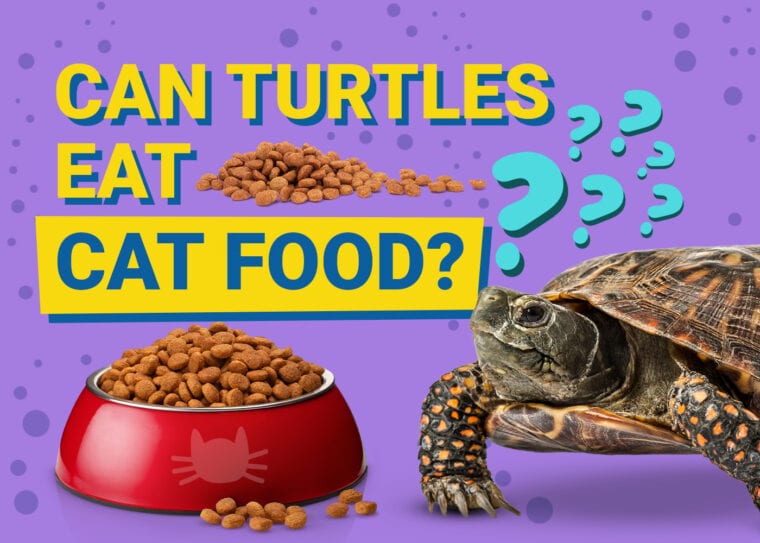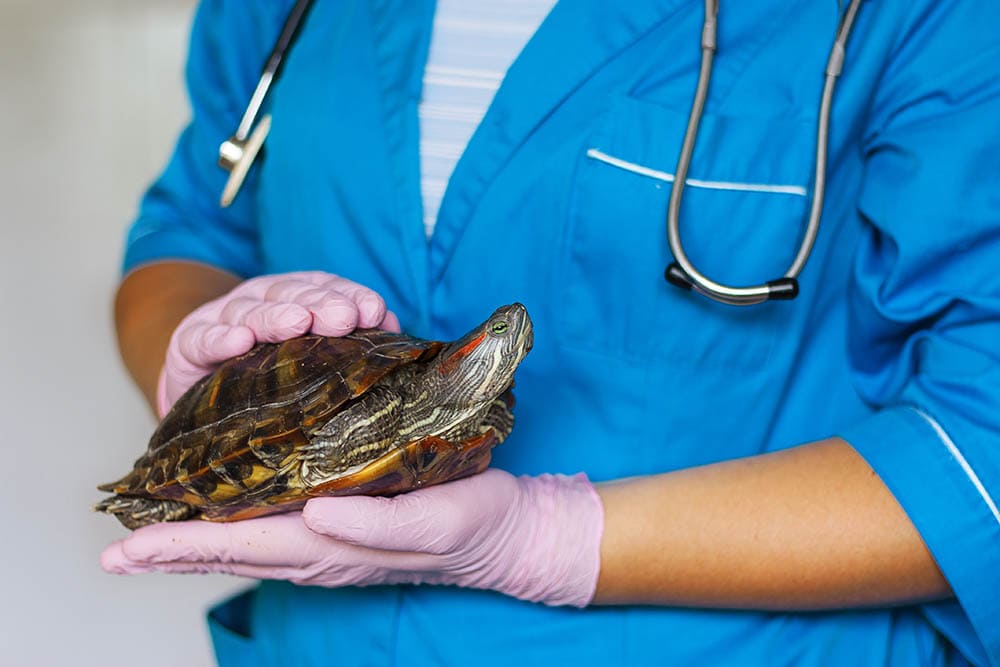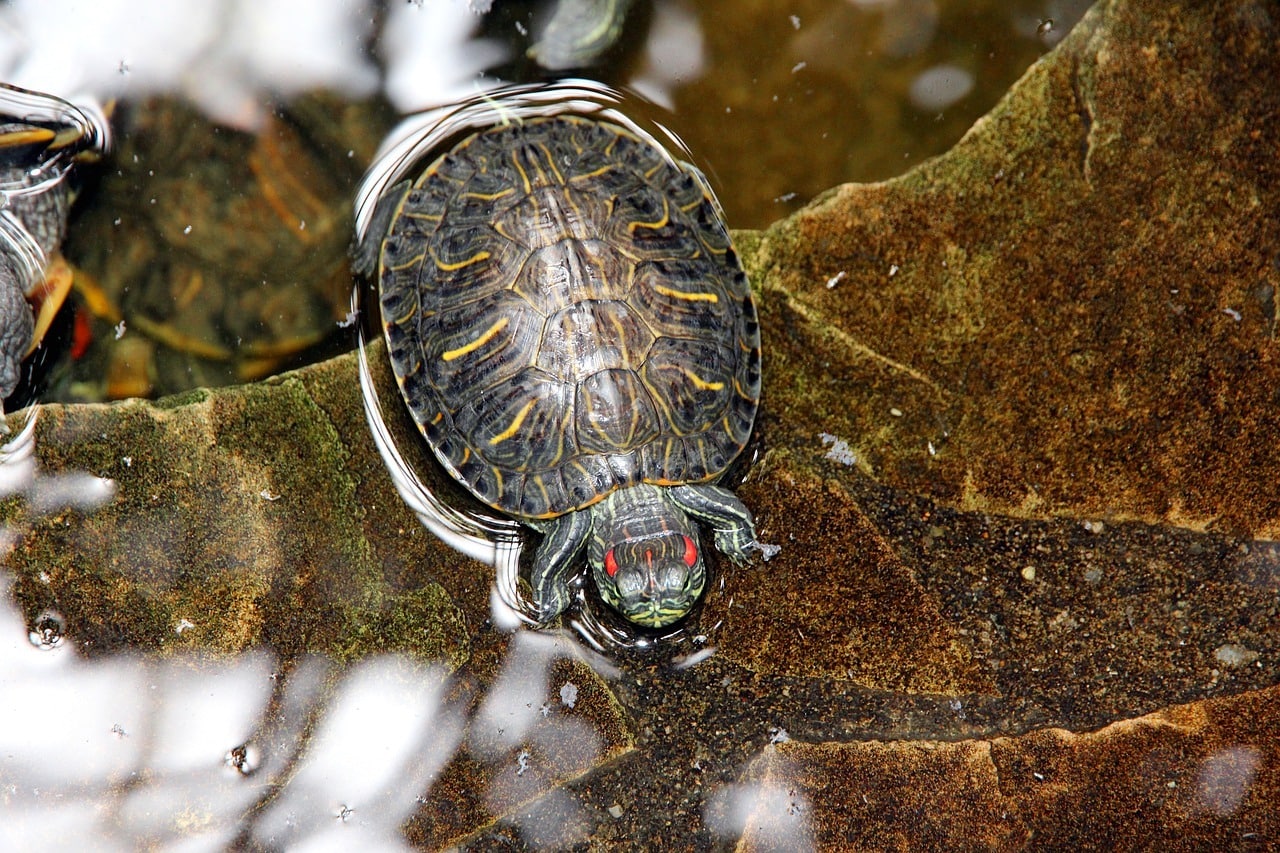
When it comes to feeding our pets, it’s essential to understand their dietary needs to ensure their health and well-being. Although most turtles are omnivores, their diet varies considerably depending on multiple factors (age being chief among these). This gives some turtle owners the idea of feeding other kinds of foods to turtles.
If you find yourself wondering whether turtles can eat cat food, the answer is that while cat food likely isn’t toxic for turtles, it is not suitable for their nutritional needs. Therefore, you shouldn’t offer cat food to your pet turtle.
Let’s explore the reasons behind this and shed light on the importance of feeding turtles a proper diet! Please note that in this article, we’ll be focusing on freshwater turtles (also known as terrapins).
Cat Diet vs. Turtle Diet: How Do They Differ?
Cats and turtles have vastly different dietary needs due to their distinct physiological characteristics. Cats are obligate carnivores, meaning they require a diet primarily composed of animal protein. On the other hand, freshwater turtles are usually omnivores or herbivores, depending on their species. Their diets consist of a combination of plant matter, fruits, and small insects or other animals/invertebrates.
Turtles, depending on their species, have evolved to consume a variety of foods, such as leafy greens, vegetables, fruits, and even small aquatic organisms. Some turtles, like red-eared sliders, have a broader omnivorous diet, while others are somewhat limited in their dietary profile.

What Is in Cat Food?
Cat food is specifically formulated to meet the nutritional requirements of cats. As obligate carnivores, cat food should contain a high percentage of animal protein and fats and minimal amounts of non-nitrogen carbohydrates. Commercial formulations are designed to support the unique dietary needs of felines and are often supplemented with other essential nutrients.
The 3 Reasons Why You Should NOT Feed Cat Food to Your Turtle
Since we’ve established how different the cat and turtle diet is, here are reasons why cat food should be avoided for your turtle!
1. Turtles and Cats Have Different Dietary and Nutritional Requirements
Turtles have different nutritional requirements compared to cats. While turtles do require protein in their diet, cat food is tailored to meet the high protein needs of felines and therefore, often results in your turtle receiving far too much protein and fat. Feeding cat food to turtles can lead to imbalances and deficiencies in essential nutrients.

2. Cat Food Has Too Much Protein
Cat food typically contains high levels of protein derived from animal sources. While protein is crucial for cats, excess protein in a turtle’s diet can lead to health issues, such as obesity or shell pyramiding.
3. Cat Food Has Too Much Fat
Cat food also tends to be higher in fat content compared to what turtles need. Excess fat can lead to obesity and related health problems in turtles, such as shell deformities and compromised mobility. While a few incidents of cat food may not immediately lead to weight gain, regular consumption can easily cause problems related to your turtle’s weight.

4. Filler Foods
Cat food often contains fillers like grains and carbohydrates that are not appropriate for turtles. These fillers lack the necessary fiber and other nutrients that turtles require for healthy digestion and overall well-being.
Is Cat Food Toxic to Turtles?
While cat food is not toxic to turtles in small quantities, it is still not suitable for their long-term dietary needs. Feeding cat food to turtles can lead to nutritional imbalances, which can have adverse effects on their health and development. It’s crucial to provide turtles with a diet specifically tailored to their species to ensure their overall health and longevity.

My Turtle Ate Cat Food, What Should I Do?
If your turtle accidentally consumes cat food, don’t panic. One isolated incident is unlikely to cause immediate harm. Turtles are curious and can also have scavenger tendencies, so they may find themselves eating unusual foods once in a while.
However, it’s crucial to refrain from regularly feeding cat food to your turtle. Be sure to monitor your turtle’s behavior, appetite, and overall health. If you notice any unusual signs or changes, consult a veterinarian who specializes in reptiles.
Turtle Nutrition
To ensure your turtle’s well-being, it is crucial to provide them with a varied and balanced diet tailored to their species. A proper turtle diet should consist of several key elements.
The precise dietary needs of freshwater turtles kept as pets have not been established in veterinary practice yet. Several factors influence the nutritional requirements of a turtle. Some of these factors have a direct influence, while others play a more subtle and indirect role in the way that they interact with a turtle’s nutritional requirements. Therefore, you’ll need to discuss your turtle’s nutritional needs with your veterinarian.
Age
Although most freshwater turtles are classified as omnivores, they almost always have a dietary bias depending on their age. While species-related factors should be accounted for, broadly speaking, most young turtles lean toward a carnivorous diet, and a substantial amount of their nutrition is derived from either hunting prey or scavenging on carcasses of animals that they come across.
As they age, most turtles tend to shift their diet to mimic that of a herbivore; indeed, some species can become almost exclusively herbivores as they age, with over 95% of their diet becoming plant based. This drastic shift in dietary composition means your turtle’s nutritional composition will vary considerably according to their age.
Senescence, or the onset of seniority, is not a recognized phenomenon in many reptiles, including almost all turtles. So, unlike some other pets, there aren’t any “senior” diets for turtles.

Environmental Conditions
Turtles are cold-blooded animals. This means their metabolism is regulated in part by their environment. They are metabolically more active in warm environments and conversely, are less active in cold environments. Turtles have a phenomenal ability to lower their metabolic rate as temperature drops, and they may not need to eat for several months of winter.
As pets, they will undergo similar dietary changes when housed in a safe outdoor enclosure (which is the norm for their welfare). When pet turtles are kept indoors, many owners simulate winter temperatures as the seasons shift, as this plays a key role in regulating the hormonal cycles of certain species of turtles. During these times, a turtle’s nutritional needs will drastically change.
Life Stage
Although adult turtles often experience a dietary shift from their juvenile counterparts, this doesn’t mean that their diet won’t change beyond this point. An adult turtle that’s in maintenance will have nutritional needs that are different from those of a turtle that is brumating (hibernating) or breeding. A female turtle’s nutritional requirements change considerably when she is about to lay eggs. Likewise, a healthy turtle will have a different nutritional profile than a turtle that is unwell, as several ailments or diseases may mandate a dietary change.
Final Thoughts
While turtles and cats may share our homes as pets, their dietary needs differ significantly. While cats thrive on a diet rich in animal protein, turtles require a diverse and balanced diet that varies considerably depending on myriad factors.
Feeding cat food to turtles can lead to nutritional imbalances and health issues in the long run. By understanding and meeting the dietary requirements of our pets, we can ensure that they maintain a good quality of life!
- Related Read: Can Turtles Eat Dog Food?
Featured Image: Africa Studio, Shutterstock












